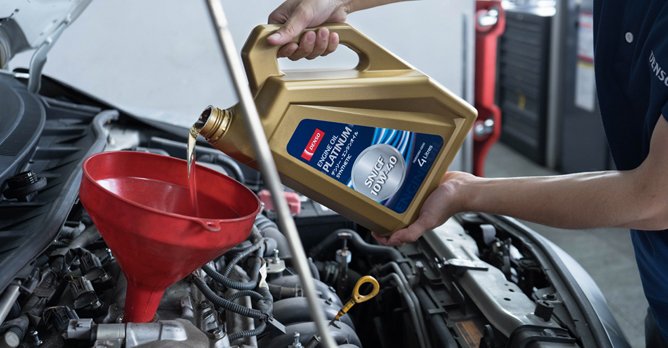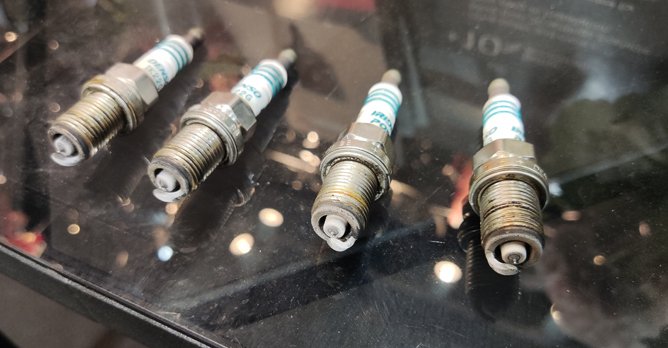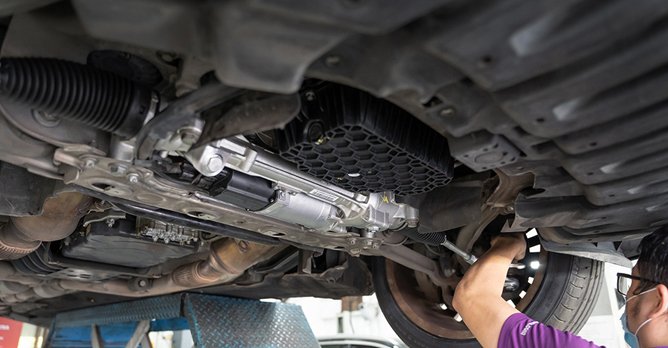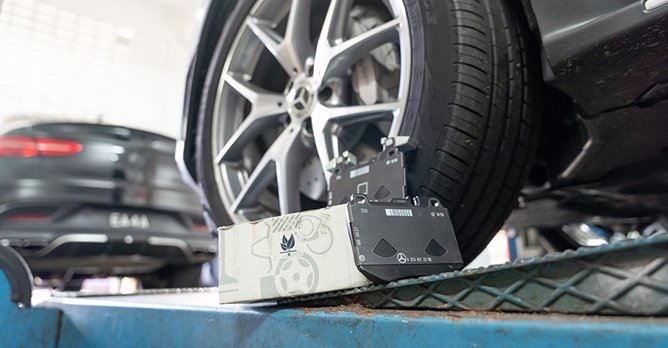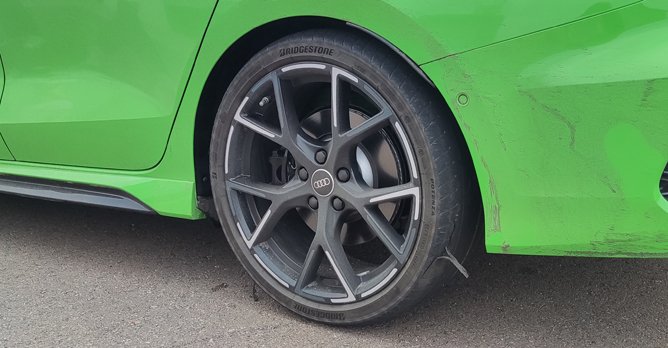Car servicing in Singapore - what goes on behind the scenes when you service your car?
28 Apr 2022|6,391 views
Car repair and maintenance is something that all car owners should be familiar with. Among the countless bit and pieces of parts that make up a car are various mechanical systems and components, which require routine servicing in order to work properly and reliably.
But do you actually know what are the things done to your car at a minor or major service? And how each service affects your car's performance and reliability? Well, no worries, we are here to share what goes on in the workshop when you send your car in, and why these procedures matter.
Minor servicing
Minor servicing are usually those that can be completed within a relatively short time span. We are talking about 30 minutes to a couple of hours at most. The most common one that everyone knows about would likely be an engine oil change. Meanwhile, other minor services include spark plugs replacement, air filter replacement, transmissions, power steering and brake fluid change or top up, brake pads and tyres replacement.
Engine oil and filter change
An engine oil change is typically what most people are referring to when they talk about sending their car in for servicing. Depending on the type and grade of engine oil used, as well as the type of engine, engine oil change intervals are typically every 5,000km (mineral and semi-synthetic oils) to 10,000km (fully-synthetic oils).
Engine oil is crucial to the health of an engine. It lubricates the moving components within an engine and allows it to run within a controlled range of temperature. The oil will also carry contaminants away from the engine components, which will then be trapped by the oil filter - hence an oil filter change is an important step during an engine oil change.
Spark Plugs replacement
Spark plugs are a small component that plays a crucial role in the normal operation of an engine - they provide the spark that ignites the mixture of air and fuel within the engine's cylinder. Without spark plugs your engine wouldn't work.
A spark plug replacement on a typical in-line four engine is usually a painless process that wouldn't take more than 30 minutes or so for a mechanic. However, certain engines might have more spark plugs, or have the spark plugs located at tricky spots which will make the job much more labour intensive and costly.
The good news, is that spark plugs will typically last around 100,000km or more when you opt for the slightly more expensive Iridium ones, which are really affordable in recent times, so it isn't something that has to be replaced too often. Faulty spark plugs can bring about issues such as misfires, which will result in a loss of power or hesitation when you try to accelerate as well as a rough idle.
Air Filter
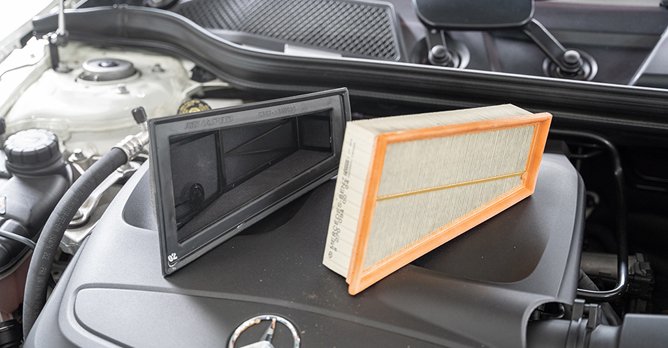
An air filter's job is to filter the air that enters the engine, somewhat like the mask that we wear to keep viruses out. It gets dirty overtime and becomes restrictive, reducing the amount of air that can be supplied to the car engine. Hence, an air filter replacement is needed once in a while.
Most cars use a paper-element panel filter encased within the airbox. These are replaced routinely, while some cars might have aftermarket washable and reusable air filter installed. Servicing of the air filter is usually a relatively simple procedure that wouldn't take too much time or be too costly either.
Transmission fluid
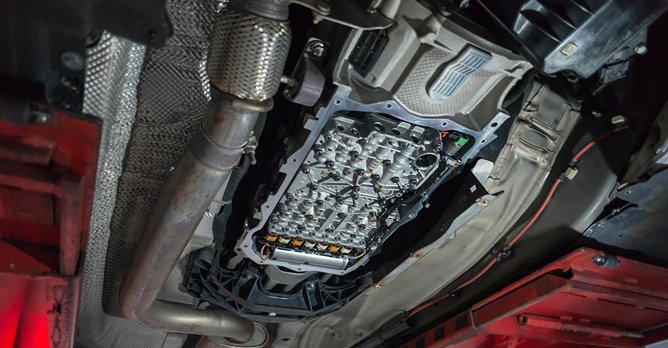
Clean and fresh transmission fluid can ensure the smooth and reliable operation of a transmission, and would prove to be worthy in the long run as you would be able to minimise the possibility of an early and expensive failure of the components within the transmission.
Rear-wheel drive and all-wheel drive cars would also have a differential which will require a fluid change every now and then as well to ensure its smooth operation.
Power steering fluid
The power-assisted steering systems in older cars in general are hydraulic systems that require power steering fluid. Generally, the system should not consume fluid if there isn't any leak. It is a rather low maintenance system, but you won't do any harm getting it checked and changed once in a while.
Newer cars which run on Electric Power Steering (EPS) systems usually wouldn't require any power steering fluid.
Brake fluid, rotor and pads
Brakes are arguably one of the most important parts in your car, you wouldn't want to encounter a brake issue when you are driving, as that would mean you won’t be able to stop your car!
Like all hydraulic systems, the fluid is crucial to its performance. Brake fluid will absorb the water in the air and its performance will deteriorate over time, hence it is important to keep your brake fluid fresh to ensure a positive brake feel.
Meanwhile, the brake rotor and pads are wear-and-tear components that will wear out over time. It is important to ensure their serviceability and get them replaced as and when necessary to ensure a safe and reliable braking system. Getting your car's brakes sorted out can take more than a couple of hours at a workshop, but it is well worth the time and money as your safety is at stake.
Tyres
One can never over emphasise the importance of tyres. After all, these are the only points of contact that a vehicle has with the road surface. Typically, tyres needs to be replaced when their treads are worn, the interval can vary depending on driving style, conditions and mileage. However, you should also change your tyres that are visible cracks or damage.
Worn tyres should be replaced promptly to ensure the safety of a vehicle, like brakes, tyres are not something that you should skimp on.
Major servicing
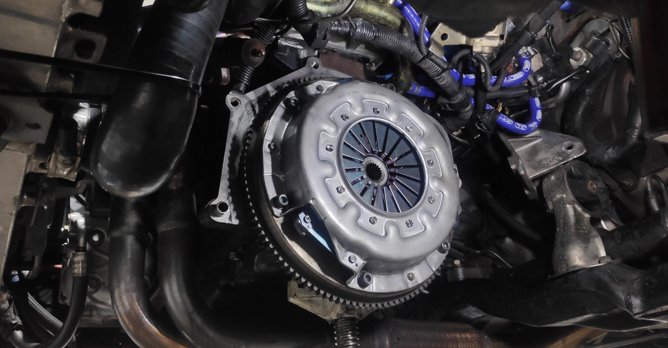
Typically, a major service can consist of the replacement of parts such as the timing belt and water pump, as well as components such as the clutch in a manual transmission equipped vehicle.
The interval for a timing belt replacement is typically 100,000km, which can also translate to around five years of driving for most people. A timing belt replacement is important as the failure of it can result in catastrophic damage in certain engines. Due to the complexity of such work, it can take a full day or more for such major servicing to be completed.
Here are some related articles that might interest you
Keep these parts maintained to avoid breakdowns
Do fuel injector cleaners and octane boosters work?
Is servicing your car on time really that important?
Paddle shifters - are they better than a standard manual transmission?
The six most common myths when it comes to brakes

Sgcarmart
Join the Sgcarmart Community
Become a Community member to enjoy exclusive promos & freebies for you and your car!
- Be the first to enjoy exclusive promos & giveaways
- Enjoy membership perks for Sgcarmart services
Car repair and maintenance is something that all car owners should be familiar with. Among the countless bit and pieces of parts that make up a car are various mechanical systems and components, which require routine servicing in order to work properly and reliably.
But do you actually know what are the things done to your car at a minor or major service? And how each service affects your car's performance and reliability? Well, no worries, we are here to share what goes on in the workshop when you send your car in, and why these procedures matter.
Minor servicing
Minor servicing are usually those that can be completed within a relatively short time span. We are talking about 30 minutes to a couple of hours at most. The most common one that everyone knows about would likely be an engine oil change. Meanwhile, other minor services include spark plugs replacement, air filter replacement, transmissions, power steering and brake fluid change or top up, brake pads and tyres replacement.
Engine oil and filter change
An engine oil change is typically what most people are referring to when they talk about sending their car in for servicing. Depending on the type and grade of engine oil used, as well as the type of engine, engine oil change intervals are typically every 5,000km (mineral and semi-synthetic oils) to 10,000km (fully-synthetic oils).
Engine oil is crucial to the health of an engine. It lubricates the moving components within an engine and allows it to run within a controlled range of temperature. The oil will also carry contaminants away from the engine components, which will then be trapped by the oil filter - hence an oil filter change is an important step during an engine oil change.
Spark Plugs replacement
Spark plugs are a small component that plays a crucial role in the normal operation of an engine - they provide the spark that ignites the mixture of air and fuel within the engine's cylinder. Without spark plugs your engine wouldn't work.
A spark plug replacement on a typical in-line four engine is usually a painless process that wouldn't take more than 30 minutes or so for a mechanic. However, certain engines might have more spark plugs, or have the spark plugs located at tricky spots which will make the job much more labour intensive and costly.
The good news, is that spark plugs will typically last around 100,000km or more when you opt for the slightly more expensive Iridium ones, which are really affordable in recent times, so it isn't something that has to be replaced too often. Faulty spark plugs can bring about issues such as misfires, which will result in a loss of power or hesitation when you try to accelerate as well as a rough idle.
Air Filter

An air filter's job is to filter the air that enters the engine, somewhat like the mask that we wear to keep viruses out. It gets dirty overtime and becomes restrictive, reducing the amount of air that can be supplied to the car engine. Hence, an air filter replacement is needed once in a while.
Most cars use a paper-element panel filter encased within the airbox. These are replaced routinely, while some cars might have aftermarket washable and reusable air filter installed. Servicing of the air filter is usually a relatively simple procedure that wouldn't take too much time or be too costly either.
Transmission fluid

Clean and fresh transmission fluid can ensure the smooth and reliable operation of a transmission, and would prove to be worthy in the long run as you would be able to minimise the possibility of an early and expensive failure of the components within the transmission.
Rear-wheel drive and all-wheel drive cars would also have a differential which will require a fluid change every now and then as well to ensure its smooth operation.
Power steering fluid
The power-assisted steering systems in older cars in general are hydraulic systems that require power steering fluid. Generally, the system should not consume fluid if there isn't any leak. It is a rather low maintenance system, but you won't do any harm getting it checked and changed once in a while.
Newer cars which run on Electric Power Steering (EPS) systems usually wouldn't require any power steering fluid.
Brake fluid, rotor and pads
Brakes are arguably one of the most important parts in your car, you wouldn't want to encounter a brake issue when you are driving, as that would mean you won’t be able to stop your car!
Like all hydraulic systems, the fluid is crucial to its performance. Brake fluid will absorb the water in the air and its performance will deteriorate over time, hence it is important to keep your brake fluid fresh to ensure a positive brake feel.
Meanwhile, the brake rotor and pads are wear-and-tear components that will wear out over time. It is important to ensure their serviceability and get them replaced as and when necessary to ensure a safe and reliable braking system. Getting your car's brakes sorted out can take more than a couple of hours at a workshop, but it is well worth the time and money as your safety is at stake.
Tyres
One can never over emphasise the importance of tyres. After all, these are the only points of contact that a vehicle has with the road surface. Typically, tyres needs to be replaced when their treads are worn, the interval can vary depending on driving style, conditions and mileage. However, you should also change your tyres that are visible cracks or damage.
Worn tyres should be replaced promptly to ensure the safety of a vehicle, like brakes, tyres are not something that you should skimp on.
Major servicing

Typically, a major service can consist of the replacement of parts such as the timing belt and water pump, as well as components such as the clutch in a manual transmission equipped vehicle.
The interval for a timing belt replacement is typically 100,000km, which can also translate to around five years of driving for most people. A timing belt replacement is important as the failure of it can result in catastrophic damage in certain engines. Due to the complexity of such work, it can take a full day or more for such major servicing to be completed.
Here are some related articles that might interest you
Keep these parts maintained to avoid breakdowns
Do fuel injector cleaners and octane boosters work?
Is servicing your car on time really that important?
Paddle shifters - are they better than a standard manual transmission?
The six most common myths when it comes to brakes

Sgcarmart
Join the Sgcarmart Community
Become a Community member to enjoy exclusive promos & freebies for you and your car!
- Be the first to enjoy exclusive promos & giveaways
- Enjoy membership perks for Sgcarmart services









